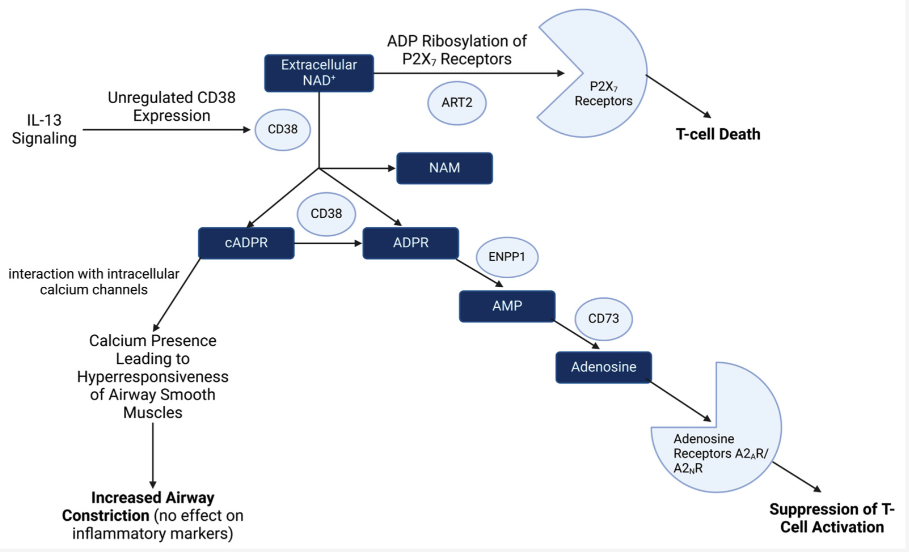A recent literature review explored the impact of extracellular NAD+ on the inflammatory response.
Key Points:
- NAD+ behaves as a messenger in immune cells
- Extracellular NAD+ calms the immune response
- NAD+ modulates allergies and asthma
It is well known that NAD+ is crucial for both energy production and cellular health. However, the role of extracellular NAD+ in the immune response is still being explored.
“Interestingly, the role of extracellular NAD+ is not well understood, but mounting evidence suggests that this form of NAD+ is a potent regulator of immune response.”
It has been found that NAD+ plays a role in asthma and allergies through immune cell modulation.
“Extracellular NAD+ interacts with a wide variety of enzymes in extracellular space and has many functions of its own that include effects on inflammatory response.”

This diagram depicts the different roles of extracellular NAD+ in suppressing immune system activity, discussed below.
NAD+ Acts as a Messenger in Immune Cells
NAD+ attaches a molecule called ADP-ribose to receptors (P2X7) on immune cells, triggered by an enzyme named ART2. This causes calcium to flood into the cell, ultimately leading to the death of specific immune cells.
Extracellular NAD+ Fights Inflammation
“Additionally, extracellular NAD+ has important anti-inflammatory activities through its relationship with CD73.”
NAD+, outside the cell, helps control inflammation. It works with the enzymes CD38 and CD73.
- CD38 processes NAD+ for signaling, creating a molecule called cADPR.
- CD73 converts cADPR to adenosine, a powerful anti-inflammatory molecule.
- Adenosine suppresses immune cell activity, calming the immune response.
“Adenosine produced by CD73 has potent anti-inflammatory effects, including suppressing T cell function.”
Studies in cells and mice demonstrate the anti-inflammatory role of CD73:
- Removing CD73 from immune cells makes them more inflammatory (1)
- Mice without CD73 have stronger inflammatory responses in their brains when exposed to a trigger (2)
“These results suggest that extracellular NAD+ in the context of CD73 signaling is anti-inflammatory.”
NAD+ Modulates Allergies and Asthma
“Many of the extracellular activities of NAD+ are facilitated by the effects of the cell surface enzyme CD38.”
CD38 is an enzyme on immune cells that breaks down NAD+ into various metabolites (cADPR, ADPR, and NAM).
These metabolites of NAD+ influence asthma and allergies, potentially involving the inflammatory cytokine IL-13.
“Allergen presence has been reported to cause the release of NAD+ into the extracellular space, which can then be utilized by CD38.”
High NAD+ Production Via NAMPT May Increase Oxidative Stress
Unbalanced NAD+ levels can also contribute to inflammation through increased production of reactive oxygen species.
Excessive production of NAD+ through the salvage pathway can increase oxidative stress and worsen symptoms in psoriasis, IBS, and other inflammatory or autoimmune conditions.
“NAD+ production (as opposed to L-tryptophan) through the NAMPT salvage pathway results in the excessive use of PARP1 and leads to significant ATP depletion.”
“The resulting oxidative stress has been reported to play a critical role in inflammatory conditions such as psoriasis.”
